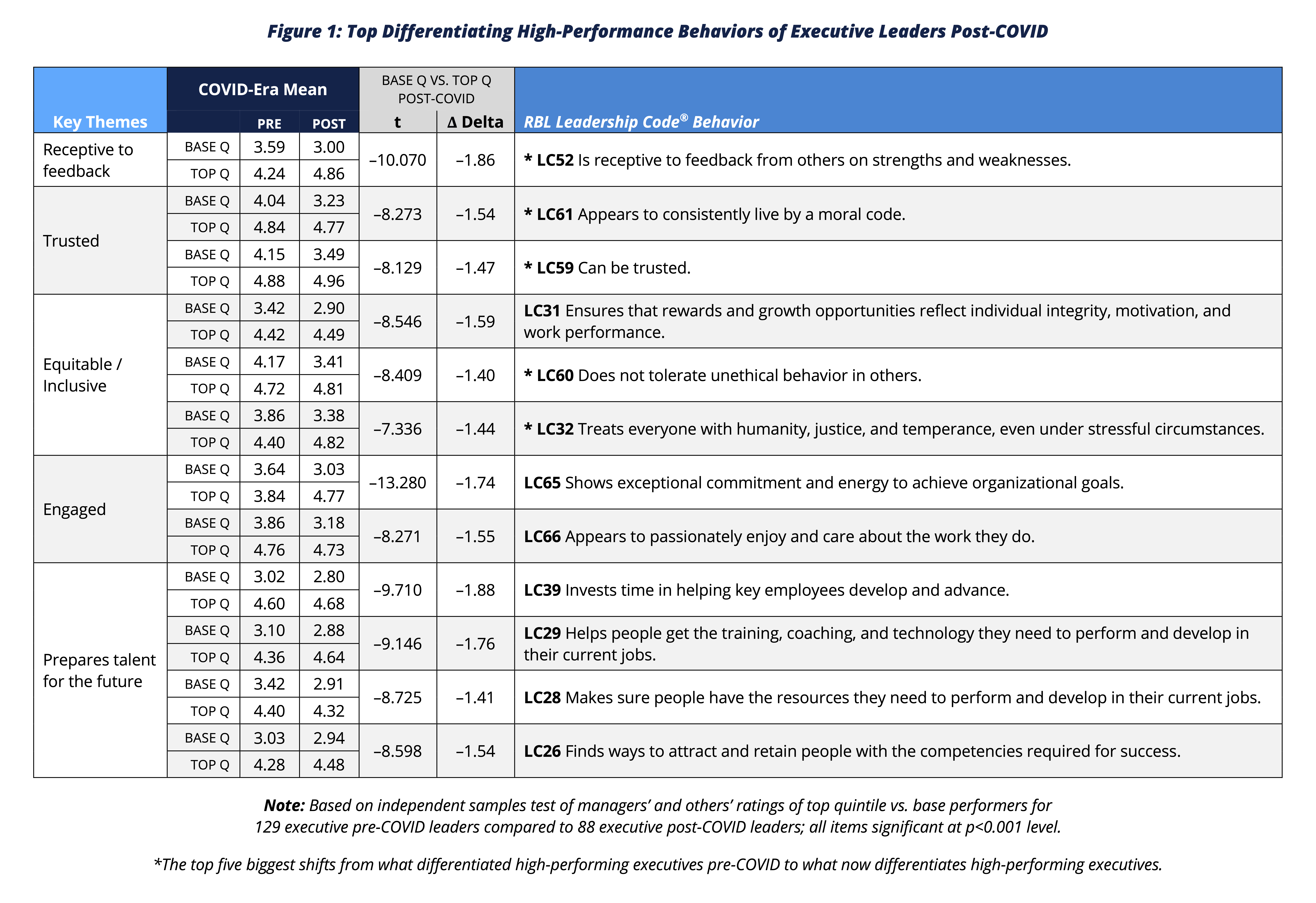What High-Performing Executives Are Doing Differently Post-COVID and Why It Matters
Key Takeaways:
- Trust in executive leaders has significantly decreased post-COVID.
- The gap between high-performing and low-performing executives has grown, with top executives excelling in feedback receptiveness, trustworthiness, equitable behavior, engagement, and talent development.
- Successful executives today seek feedback, build trust, foster inclusiveness, inspire confidence, and invest in talent development. These behaviors are critical for thriving in the current business environment and ensuring long-term success.

What High-Performing Executives Are Doing Differently Post-COVID and Why It Matters

Trust in executive leaders is declining. Employees’ trust that their leaders will do the right thing for them and for society has notably declined over the past two years, with 45 percent of HR leaders rating their organizational culture as low trust.i The 2024 World Economic Forum identified “Misinformation and Disinformation” — a growing distrust in facts and authority— as the #1 global risk over the next two years.ii
Our research offers insight into this breakdown of trust. The data (based on more than 2.2 million leadership-behavior ratings from the RBL Leadership Code® gathered over the last fifteen years) highlights a widening gap between executive leaders in how effectively they model building trust (and inclusivity).
While we looked here and here at shifts pre- to post-COVID in executive leadership behaviors, this article highlights our findings in comparing today’s top-performing executives to base performers (see Table 1). (For our methodology and our findings of high-performance data at other leadership levels, see our data on first-line leaders and mid-level leaders). 
Our Findings
Our research comparing high-performing executive leaders to base performers confirms a growing differentiation between executives in their receptiveness to feedback, ability to be trusted, skill in creating an equitable and fair work environment, engagement, and effort made in developing talent for the future.
We note that in most cases, the gap between low-performing and high-performing executives widened during and after Covid because base-quintile executives’ performance worsened, while top-quintile executives’ performance stayed the same or improved.
Implications
The pandemic exacerbated uncertainties, supply-chain demands, technology expansion, healthcare stressors, economic pressures, and more. Our data confirms that the traditional executive attributes and behaviors (delivering strong results, building a clear brand, and managing key stakeholders) are not enough to ensure success. What got executives to where they are no longer assures success—today or tomorrow.
Today’s executive leaders need authenticity, humility, and a learning mindset. They must be able to seek feedback, be flexible, and model positive engagement and hope for the future. Command-and-control leadership and executive isolation are being replaced by leaders who are fully engaged and stay directly connected with and responsive to customers and employees throughout the organization.
Today’s high performing leaders understand what is needed to grow the organization for the future, and they personally invest in mentoring and coaching to ensure their people have the skills and capabilities they need to be successful not only for today but for tomorrow.
Actions
If you are an executive or aspiring to be one, here is a checklist of critical behaviors to ensure you build and sustain high performance:
Model growth orientation
Actively seek and respond with a learning mindset to feedback from others. Studies consistently show that leaders with a high level of self-awareness achieve better results. They are more flexible and open to making adjustments and improvements that support sustainable growth. Leadership psychometric and 360 assessments, coaching, and collaborative development experiences can effectively and rapidly improve personal leadership. Maintaining open, regular communication with your teams and others in the organization facilitates information sharing and feedback that can help you identify organizational vulnerabilities and opportunities for improvement.
Build trust
The ability to build and sustain trust throughout the organization is a strong predictor of potential for executive success.iii Research shows that highly trusted leaders convey motivation toward and commitment to common goals and the ability to deliver on outcomes. They can operate within organizational structures in a way that facilitates constructive, honest dialogue. Because they engage genuinely and convey trust in the motives and intentions of others, others trust them and look to them for guidance and feedback.
Foster inclusiveness and equity
High-performing executives are notably inclusive. They lead with authenticity and transparency and treat employees at all levels throughout the organization with humanity, justice, and temperance — even under stressful circumstances. Fostering inclusiveness can be as simple as respecting the pronouns of employees at all levels of your organization to as comprehensive as ensuring that rewards and performance management systems are fair and equitable. As leaders seek, understand, and respond to the values and interests of their employees (as well as their external stakeholders), they build a culture of inclusion. Employees who feel their leaders care about them and their well-being are 3x more willing to be engaged at work and 5x more likely to advocate for their company.iv They are more productive and more profitable.v And, caring is just the right thing to do.
Inspire confidence and hope
The high-performing executive is positive and optimistic. They demonstrate commitment and energy to growing the organization and moving it forward. They are genuinely passionate about the work they do, and this passion inspires and motivates others. They sponsor and support initiatives to energize the work environment. Their confidence is rooted in a compelling growth strategy. They understand how their strategy will create value for customers and investors, and they inspire confidence and enthusiasm throughout the organization to deliver on the strategy.
Invest time in developing future talent
Effective executives are actively and personally involved in attracting, developing, mentoring, and retaining talent with diverse backgrounds and experiences for the future. They ensure their people get the training, coaching, and resources they need to build the skills critical for success. They work to ensure performance management and development processes are consistently and effectively used across the organization, and they build diverse and robust succession pipelines that anticipate market trends and future growth of the organization.
Conclusion
Poor self-awareness, lack of trust, executive isolation, treating others as means to an end, low engagement, and not investing time in mentoring and coaching others can derail an executive’s success.
High-performing executives wisely invest in introspection and are open to feedback, change, and new ideas. They foster trust throughout the organization and treat others with humanity and compassion. They build a compelling growth strategy and then energize the work environment with positivity, optimism, and passion for the work. And they invest personal time in coaching and mentoring others. Building these skills will strengthen your executive performance and help you deliver exceptional value to employees, customers, investors, and communities.
To discuss how this research can help you build an evidence-based leadership brand that increases value for your stakeholders, contact us to be connected with our leadership experts.
For more executive-level leadership research insights, click here. For first-line leadership research insights, click here and for mid-level research insights, click here.
i Mercer. Global Talent Trends Study 2024. https://www.mercer.com/insights/people-strategy/future-of-work/global-talent-trends
ii World Economic Forum Global Risks Report 2024. https://www.weforum.org/publications/global-risks-report-2024
iii https://www.rbl.net/insights/articles/predicting-potential-personality-matters
iv https://www.gallup.com/workplace/507974/leaders-ignore-employee-wellbeing-own-risk.aspx
v https://www.gallup.com/workplace/404105/importance-of-employee-wellbeing.aspx.aspx

